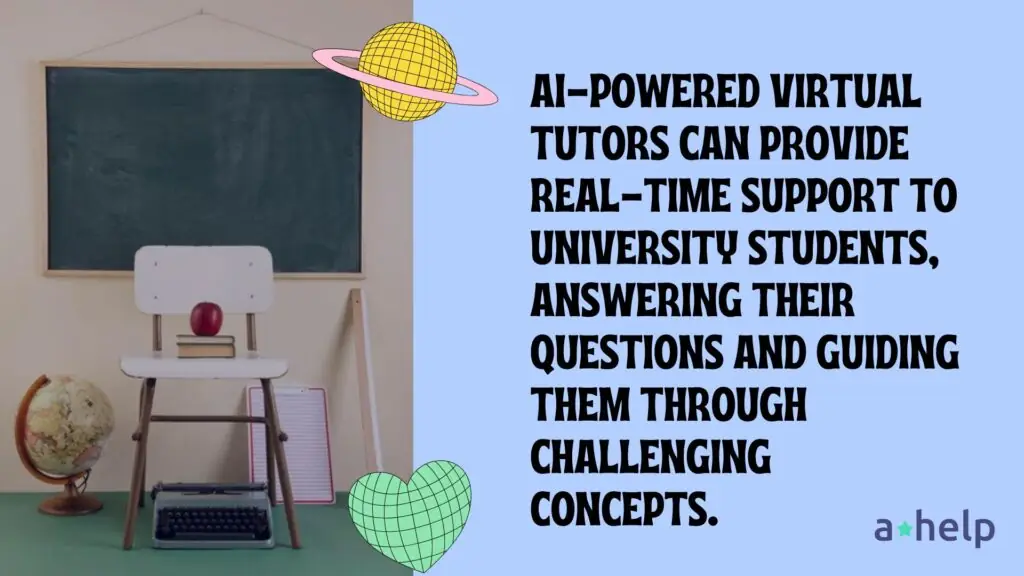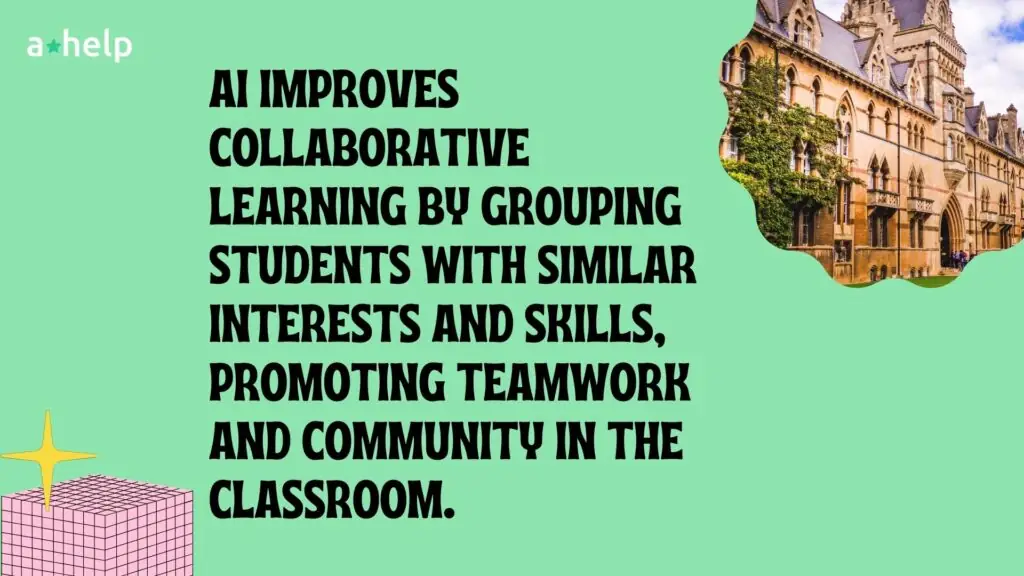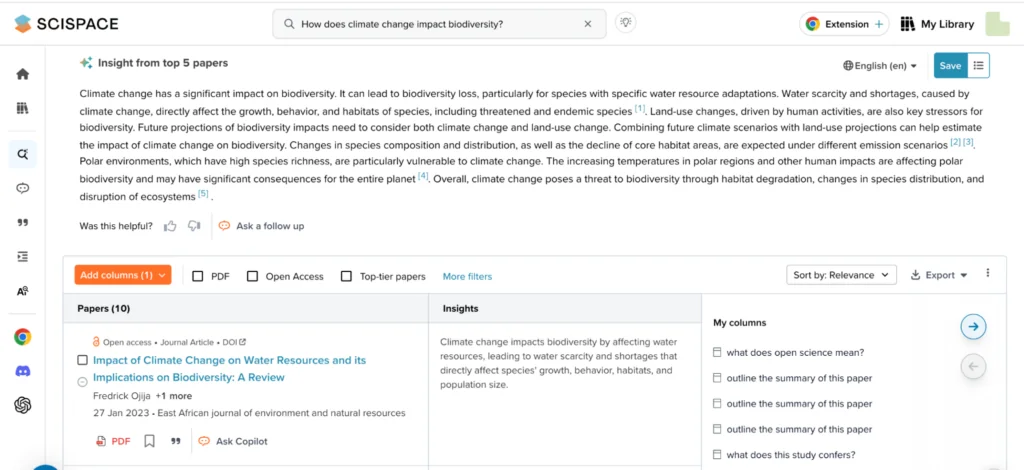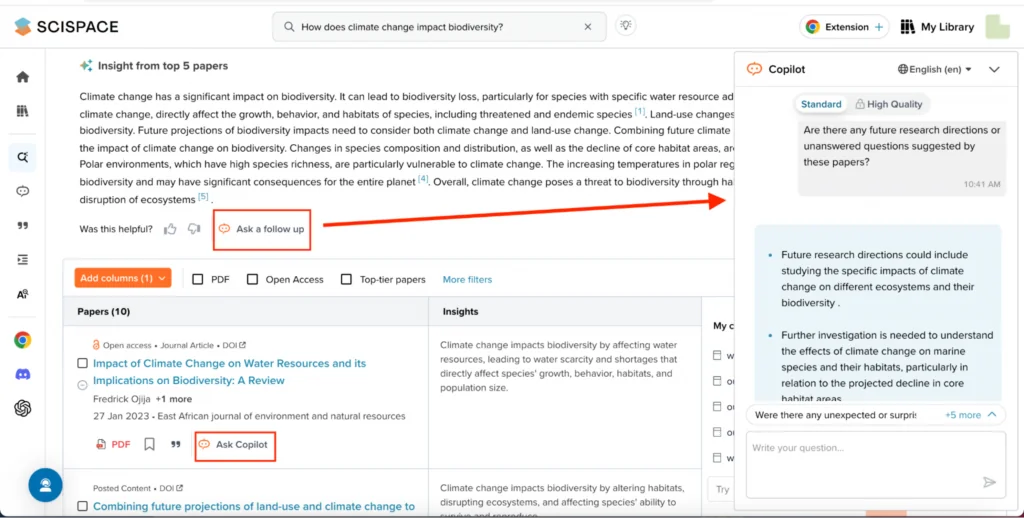Artificial Intelligence (AI) has become a buzzword in every industry, and academia is no exception. AI has garnered immense attention and deliberation in recent years. Particularly the liftoff of Generative AI (ChatGPT) has taken the world by storm, and its influence is also being felt in academia.

✅ AI Essay Writer ✅ AI Detector ✅ Plagchecker ✅ Paraphraser
✅ Summarizer ✅ Citation Generator
It has emerged as a transformative force, reshaping the landscape of education — right from personalized learning experiences to automated administrative tasks and from research discovery, research writing, and research reading to scientific publishing and biomedical innovation. The incorporation of AI tools is proving to be worth the hype, offering a myriad of benefits that enhance the scholarly experience for students, educators, and even institutions.
In this article, let’s explore more about the advantages of AI tools in academia, effectively circumventing any lingering doubts about its transformative potential.
Key takeaways:
- The onset of Generative AI is revolutionizing the way academicians deal with scientific research
- The evolution of AI tools is reshaping the research tasks including automated administrative tasks to discovery of research, writing, and reading to publishing and research promotions!
- AI tools offer collaborative learning experiences for students, streamline complicated administrative tasks for librarians and professors, automate literature review processes, and enhance reading comprehension.
- AI tools are also a victim of criticism, however, by adopting stringent protocols and following transparent AI practices, we can use AI tools ethically.
- AI’s integration into academia is redefining education, making it more dynamic, adaptive, and well-positioned for future innovation.
The Evolution of AI in Academia
Artificial intelligence — what was once considered science fiction has now become a reality. The proliferation of AI tools and their applications has been tailored to meet diverse educational needs.
Over the past few years, AI has undergone remarkable progress, making it more accessible to academicians. Initially, AI was only confined to fundamental applications, such as computer-based tutoring systems, chatbots, and translation assistance. However, with advancements in natural language processing and machine learning modules, it has evolved to encompass more intricate scientific tasks.
Today, AI-powered virtual tutors can provide real-time support to university students, answering their questions and guiding them through challenging concepts. Based on the student’s level of understanding, these virtual assistants can adapt their responses — providing personalized explanations and examples to facilitate learning.
Additionally, AI can impart equal benefits to instructors as well. Since AI can analyze large amounts of data to identify patterns and trends, this data analysis can help teaching faculties prepare well-crafted curriculum designs, instructional strategies, course timelines, and whatnot.
By leveraging AI, instructors can gain valuable insights into student academic performance, identify areas of improvement, and develop targeted tutoring techniques to help students struggling to cope with academics.
This was just a quick snapshot of the role of AI in academia. Now let’s move on to the bigger picture of the article — exploring AI tools’ multitude of significance in a broader spectrum.

The Multifaceted Benefits of AI in Academia and Education
Enhanced Learning Experiences with AI
One of the major advantages of AI in academia is its potential to deliver personalized learning experiences. As we all know, AI employs different natural language processing (NLP) and machine learning (ML) techniques to analyze vast amounts of data available on the internet. These algorithms are able to identify different trends, patterns, and correlations within large datasets which makes it fairly difficult for humans to digest everything within a short period. With continuous learning, AI algorithms adapt to new information and refine their understanding of complex datasets and that’s how they improve their accuracy over time. This is how AI tools provide insightful information, make predictions, and help us make informed decisions across various domains, be it education, research, business, or technology. The key strength of AI is its ability to efficiently process and interpret giant datasets, resulting in valuable solutions that are quintessential in today’s data-driven world.
With the ability to analyze vast amounts of data, AI-powered tools can even read and analyze students’ preferences, strengths, and weaknesses. Based on the input, it provides tailored instruction to individual needs. This personalized technique not only improves student engagement but also fosters a more collaborative, effective, and efficient learning environment.
Imagine a classroom where students are provided with a dedicated virtual tutor or AI tutor, which perceives their reading style and creates an adaptive curriculum accordingly. These AI tutors provide additional resources and real-time feedback and create customized study plans to strengthen their academic performance.
Duolingo, Carnegie Learning, and Quizlet are a few of the AI platforms that offer personalized learning experiences for students according to their needs.
Furthermore, AI can also enhance collaborative learning experiences for students. AI technologies can help them build study groups, online communities, and project teams by analyzing their interests and profiles. This ensures that students with complementary knowledge and talents are paired together. In the classroom, this fosters a sense of community in addition to encouraging teamwork and peer learning.

Streamlining Administrative Tasks through AI
There’s no denying that administrative tasks often consume a considerable amount of time. But, with the use of AI tools, we can automate mundane and repetitive admin tasks such as grading, scheduling, and data management, allowing the respective librarians or faculties to focus on other crucial activities. By reducing administrative burden, AI enables academic institutions to optimize their resources and improve overall efficiency.
Let’s take an example of the process of grading assignments and exams. When it’s manually done, it’s both time-consuming and overwhelming. However, with the implementation of AI technology, this process can be expedited and made more error-free and accurate.
AI algorithms can analyze and evaluate student work, providing instant feedback and thus reducing the turnaround time required for grading. This not only benefits educators by allocating more time to providing personalized guidance and support but also helps students by providing timely feedback.
The University of Miami also uses intelligent grading software like Gradescope, Akindi, and Crowdmark as they reduce the time required for manual assessment evaluation and grading. They also underscore that by using AI grading software, teachers can focus more on providing detailed feedback while these tools can take care of other tasks, including course preparation, student roster scheduling, and more.
AI in Research: A Game Changer
Research and innovation are the two significant aspects of academia, and AI is already revolutionizing the way we conduct and analyze research. The capability of AI algorithms to process large datasets and generate quicker insights is stealing the spotlight in enhancing reading comprehension and streamlining literature review for researchers.
For example — while conducting a literature review and trying to analyze a voluminous dataset containing hundreds of scientific publications, manually going through all the research papers would be time-consuming and prone to missing out on the relevant papers. However, with AI tools like SciSpace Literature Review, researchers can utilize machine learning algorithms to quickly identify relevant scientific papers and conduct a thorough literature review by comparing and contrasting multiple research papers on a single screen. This not only accelerates the research process but also opens up new avenues for research exploration and discovery.

Another vital feature associated with SciSpace Literature Review is the integration of the AI research assistant “SciSpace Copilot”. With Copilot, you can ask any follow-up questions about the research papers appearing in the matrix and get more insights about the specific topics of the papers.

This way, researchers can save more time and stay up-to-date with the latest scientific publications in their field. Furthermore, AI can facilitate interdisciplinary collaborations by connecting researchers with similar interests or complementary expertise. AI-powered platforms like ResearchGate and Academia.edu can analyze researchers’ profiles, publications, and research interests to identify potential collaborators, fostering scientific innovation, and knowledge exchange.
Now, you can access all these features on the ChatGPT platform by accessing SciSpace’s custom GPT. SciSpace GPT is a ResearchGPT specifically designed for students and researchers to streamline their academic tasks all-in-one platform. You can try it here — SciSpace GPT.
Addressing the Challenges of AI
Despite the advantages and proven use cases of artificial intelligence (AI) in academia, criticism and skepticism have no escape. There are several obstacles to overcome when using AI technologies in academics, such as technical barriers, data privacy concerns, and ethical considerations. However, these challenges are not invincible.
Here are a few challenges and criticisms enlisted:
- 🔐 Ethical Considerations — By implementing robust data security protocols, well-defined policies, and transparent AI practices, these obstacles can be mitigated. Thus, responsible and ethical usage of AI in education can be ensured.
- 💻Technical Obstacles — Technical barriers, such as the requirement for specialized infrastructure and the lack of compatibility between different AI systems, can be addressed through collaborative initiatives between academia, industry, and stakeholders. Academic institutions can maximize the potential benefits of AI technology by ensuring their seamless integration into current educational systems through the establishment of standard AI practices and frameworks.
- 🛡️Data Privacy Concerns — Data privacy concerns are legitimate when it comes to the use of AI. Prioritizing data protection and establishing precise policies for data collection, storage, and usage is imperative for educational institutions. Institutions can foster trust and protect sensitive information by using privacy-enhancing technologies.
- 📖Formulate Ethical Principles — While using AI, ethical considerations must be taken exceptionally deep. To ensure fairness, accountability, and transparency in the use of AI, institutions should create codes of conduct and ethical principles. Any biases or unforeseen repercussions that may result from AI systems can be found and addressed with the use of routine audits and assessments.
The Future of AI in Academia
As technology continues to evolve, AI is set to play an even more significant role in shaping the future of academia. It is vital to keep up with emerging trends and understand how they can be leveraged to create a more innovative and inclusive educational landscape.
New developments, such as virtual reality, adaptive learning systems, and others, have the potential to completely transform the way teachers instruct and students learn. These emerging trends provide exciting possibilities to further enhance the educational experience and cater to diverse learning needs.
Fortunately, artificial intelligence (AI) is becoming a crucial component of the educational ecosystem and isn’t only a fad in academics. It has the potential to impact all facets of higher education as it develops. Thus, investing in AI tools is a long-term strategic choice that can have a substantial effect on academic institutions.
Author’s Bio
This article is written by Saikiran Chandha is the CEO and founder of SciSpace, an end-to-end research platform that is revolutionizing the way research is being read and disseminated through AI.

Follow us on Reddit for more insights and updates.





Comments (0)
Welcome to A*Help comments!
We’re all about debate and discussion at A*Help.
We value the diverse opinions of users, so you may find points of view that you don’t agree with. And that’s cool. However, there are certain things we’re not OK with: attempts to manipulate our data in any way, for example, or the posting of discriminative, offensive, hateful, or disparaging material.